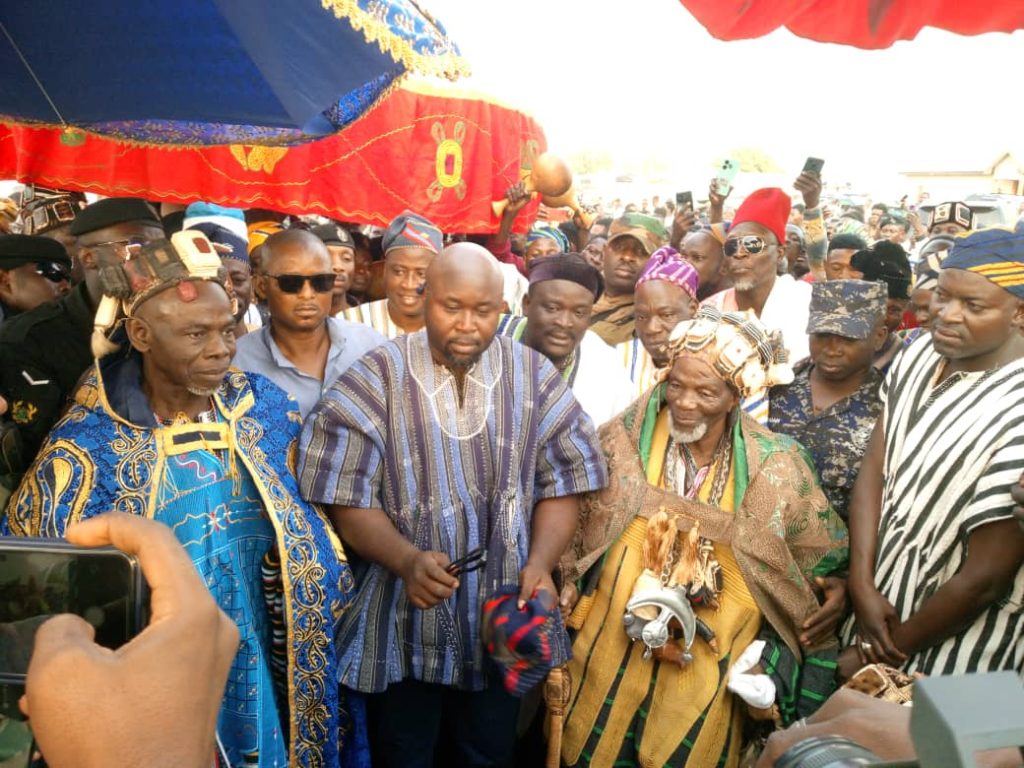In a historic display of unity and peaceful coexistence, the Overlord of Dagbon, Yaa Naa Abukari II, paid a reciprocal visit to the Overlord of the Gonja Kingdom, Yagbon Wura Bikunuto Jewu Soale I. This visit underscores the growing collaboration between the two prominent traditional authorities in Northern Ghana, sending a strong message on the need for unity and peaceful resolution of disputes in a region often plagued by chieftaincy conflicts.
A Symbol of Unity and Brotherhood
The visit by Yaa Naa Abukari II is a testament to the strengthening ties between the Dagbon and Gonja kingdoms. It follows a similar visit by Yagbon Wura Bikunuto Jewu Soale I to the Dagbon Kingdom, symbolizing a spirit of reciprocity and mutual respect between the two traditional rulers. Their actions highlight the power of traditional leadership in fostering peace and stability in Northern Ghana.

Historically, ethnic rivalries and chieftaincy disputes have contributed to tensions in the region, often escalating into violent conflicts. These disputes, frequently driven by land ownership, political affiliations, and succession disagreements, have disrupted socio-economic development. However, by setting an example of cooperation, Yaa Naa Abukari II and Yagbon Wura are demonstrating that peaceful coexistence is not just possible but essential for the progress of their people.
Lessons for Chiefs in Northern Ghana
The reciprocal visits between these two revered traditional leaders serve as a call to action for chiefs across Northern Ghana. If traditional rulers can prioritize dialogue, mutual respect, and cultural exchange, then long-standing conflicts within and between ethnic groups can be resolved amicably.
Chiefs play a crucial role in their respective communities, serving as custodians of tradition, mediators in disputes, and symbols of authority. However, when divisions exist among them, the repercussions are felt by their people. Yaa Naa Abukari II and Yagbon Wura Bikunuto Jewu Soale I’s demonstration of unity should inspire other chiefs to initiate peace talks, seek common ground, and work together towards conflict resolution rather than deepening existing divisions.
Leveraging Traditional Authority for Development
Peaceful coexistence among ethnic groups is a prerequisite for sustainable development. When chieftaincy disputes are minimized, communities can focus on economic activities, infrastructure development, and education. Investors and development partners are also more likely to engage with regions that demonstrate stability and unity.
Northern Ghana has great potential for agricultural development, trade, and tourism, but these opportunities are often overshadowed by conflicts. Traditional rulers, therefore, have a responsibility to ensure that peace prevails, allowing their people to reap the full benefits of economic growth.
The Way Forward
To build on the example set by Yaa Naa Abukari II and Yagbon Wura Bikunuto Jewu Soale I, it is imperative that traditional rulers:
- Engage in Inter-Ethnic Dialogues: Chiefs from different ethnic backgrounds should regularly engage in discussions to address misunderstandings and promote harmony.
- Work with Government and Security Agencies: Traditional leaders must collaborate with state institutions to find sustainable solutions to chieftaincy conflicts.
- Educate the Youth on Peacebuilding: The next generation should be taught the importance of unity and respect for different ethnic groups to break the cycle of inherited conflicts.
- Encourage Conflict Resolution Mechanisms: Traditional arbitration and mediation should be strengthened as effective ways of settling disputes without violence.
The visit of Yaa Naa Abukari II to Yagbon Wura Bikunuto Jewu Soale I is more than just a courtesy call—it is a beacon of hope for peace and unity in Northern Ghana. Their leadership is a reminder that cultural and ethnic differences should not be a source of division but rather a foundation for mutual respect and growth. If other chiefs across the region adopt similar gestures, Northern Ghana can witness a transformation from a conflict-prone area to a hub of peace, progress, and prosperity.
Source: Ibrahim Angaangmeni Alhassan, Journalist.


